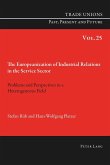In recent decades many countries have implemented neoliberal reforms that have had adverse consequences for unions. In Chile this process was particularly sweeping, having occurred under the right-wing dictatorship of General Augusto Pinochet. Despite the transition to democracy in 1990, the labor relations system created by the Pinochet regime is still largely in place. Although a number of works have assessed the conditions of unionism in post-dictatorship Chile, little attention has been paid to the firm level, which is where most of the collective bargaining now takes place.
This book takes a qualitative approach to examining the dynamics of collective bargaining at the firm level in democratic Chile by investigating the causes of variation in the bargaining outcomes of fifty-three unions in four firms in the banking, manufacturing, retail and telecommunications sectors. It seeks to explain both variation in individual union bargaining outcomes within firms and aggregate differences in outcomes between firms. The book also provides a systematic explanation of the decline of collective bargaining results among Chilean unions in general during the 1990s and early 2000s.
This book takes a qualitative approach to examining the dynamics of collective bargaining at the firm level in democratic Chile by investigating the causes of variation in the bargaining outcomes of fifty-three unions in four firms in the banking, manufacturing, retail and telecommunications sectors. It seeks to explain both variation in individual union bargaining outcomes within firms and aggregate differences in outcomes between firms. The book also provides a systematic explanation of the decline of collective bargaining results among Chilean unions in general during the 1990s and early 2000s.








